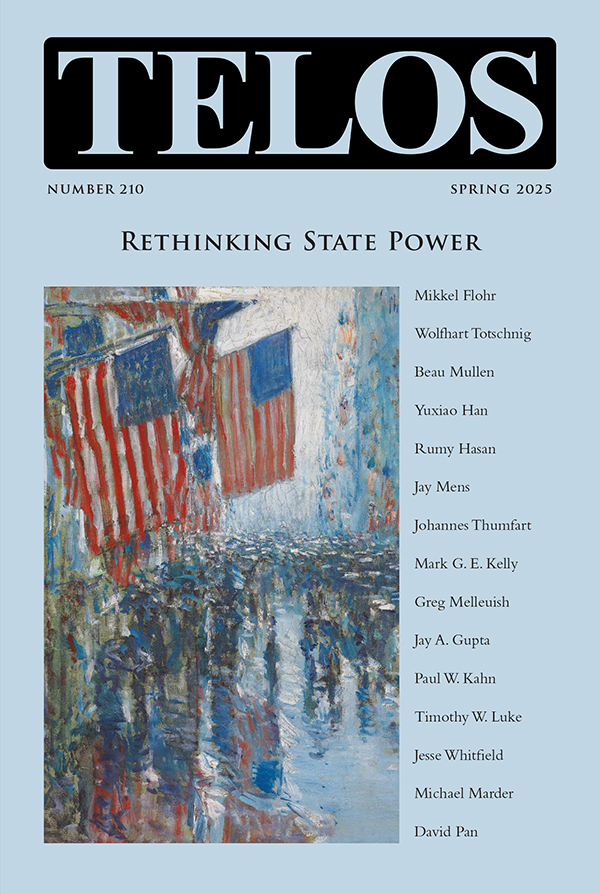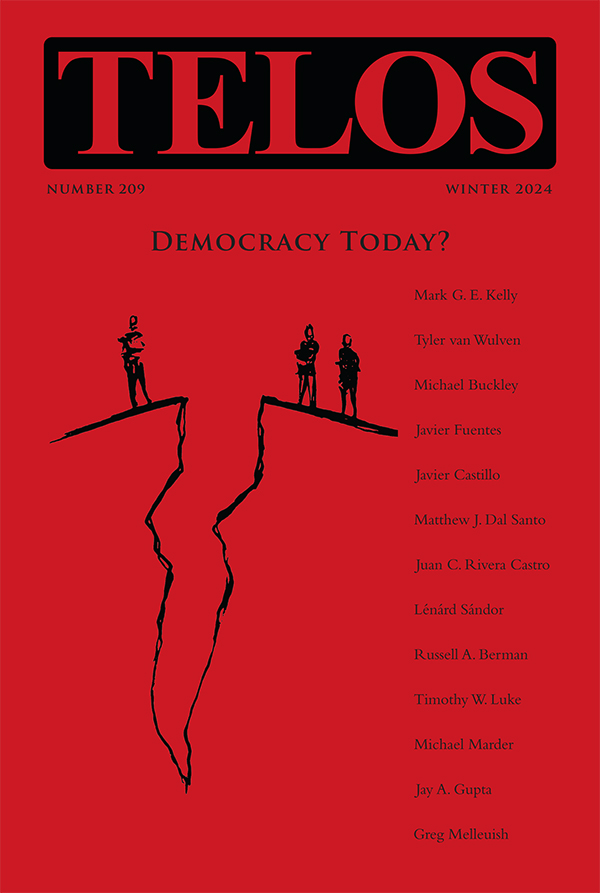By David Pan · Monday, March 24, 2025 Telos 210 (Spring 2025): Rethinking State Power is now available for purchase in our store. Individual subscriptions to Telos are also available in both print and online formats.
 Frustrating the hopes of cosmopolitans and globalists, state power is back. Rather than imagining a replacement of sovereignty with law, political debates now revolve around the particular forms that state sovereignty might take. Even Europe, long seeing itself as the place from which a new international legal order might expand its reach, is reinvesting in military power to protect its sovereignty from the threats posed by Russia, China, and, in some ways, the United States. Yet this realization about the continuing centrality of the state does not mean an abandonment of the moral imperatives and prejudices of the people. On the contrary, state power is being recognized as the instrument through which the people can exercise their will, even as the state places constraints on popular sovereignty. The essays in this issue of Telos consider the ways in which state power interacts with popular attitudes and social institutions in order to establish the basis for sovereignty and law. Frustrating the hopes of cosmopolitans and globalists, state power is back. Rather than imagining a replacement of sovereignty with law, political debates now revolve around the particular forms that state sovereignty might take. Even Europe, long seeing itself as the place from which a new international legal order might expand its reach, is reinvesting in military power to protect its sovereignty from the threats posed by Russia, China, and, in some ways, the United States. Yet this realization about the continuing centrality of the state does not mean an abandonment of the moral imperatives and prejudices of the people. On the contrary, state power is being recognized as the instrument through which the people can exercise their will, even as the state places constraints on popular sovereignty. The essays in this issue of Telos consider the ways in which state power interacts with popular attitudes and social institutions in order to establish the basis for sovereignty and law.
Continue reading →
By David Pan · Monday, January 6, 2025 Telos 209 (Winter 2024): Democracy Today? is now available for purchase in our store. Individual subscriptions to Telos are also available in both print and online formats.
 Since the supposed triumph of liberal democracy with the end of the Cold War, democracy seems now to be in retreat. The hung parliaments in France and Germany, reminiscent of the divides of Germany’s Weimar Republic; the just-in-time reversal of the declaration of martial law in South Korea; the increasing authoritarianism of China, Iran, and Russia; and the deterioration of democratic norms in the United States are all indications that the liberal democratic end of history was a chimera. Since the supposed triumph of liberal democracy with the end of the Cold War, democracy seems now to be in retreat. The hung parliaments in France and Germany, reminiscent of the divides of Germany’s Weimar Republic; the just-in-time reversal of the declaration of martial law in South Korea; the increasing authoritarianism of China, Iran, and Russia; and the deterioration of democratic norms in the United States are all indications that the liberal democratic end of history was a chimera.
What is the situation of democracy today? Are the present problems simply growing pains in the inevitable march of history, or are there fundamental limitations of this political form? Is democracy a stable form of government or a delicate balancing act that will always be at risk of deteriorating and being replaced by some form of authoritarianism?
These current indications of the precarity of democracy also coincide, however, with an intense concern for its future. Never has there been such a focus on democracy as a political goal. During the Cold War, the United States, more concerned about promoting capitalism than defending democracy, supported capitalist authoritarianism in places such as Chile, South Korea, and Taiwan. But as it turned out, capitalism did not really need such political backing. In the Cold War between capitalism and communism, the latter lost based on its inability to produce economic growth. Insofar as communism’s undermining of private property and market mechanisms proved to be economically catastrophic, even nominally communist governments in China and Vietnam have since voluntarily embraced capitalist economic policies. Aside from U.S. college campuses, the only diehard Marxists left are in Cuba, North Korea, and Venezuela, all of whose governments are presiding over the immiseration of their peoples.
While it was the Soviet Union, and not capitalism, that collapsed under the weight of its own contradictions, the general recognition of these contradictions meant that communism could only maintain itself by using repressive methods. Communism has been one of the surest ways of moving toward and cementing authoritarianism and totalitarianism. By contrast, capitalist authoritarianism has sometimes led to democratic reforms, and we can point again to Chile, South Korea, and Taiwan, but also to the countries of Eastern Europe, as successful transitioners to democracy within a capitalist framework. Unfortunately, while communism might correlate strongly with authoritarianism, the link between capitalism and democracy does not seem to be so tight.
Continue reading →
By Antonio Lecuna · Tuesday, December 5, 2023 Argentina was among the wealthiest economies at the beginning of the twentieth century, according to the “Argentine Paradox” case study by Harvard Professor Rafael di Tella and New Change FX Chief Operations Officer Ingrid Vogel. The authors claim that under the global gold standard, international capital flooded into the country to exploit the unbounded investment opportunities. The economy maintained an average annual inflation rate of just 1.5 percent for fifty years after 1890. Parallel to low inflation, from 1900 to 1930, Argentina’s economy grew at an average annual rate of 4 percent—faster than the United States, Australia, or Canada. However, over the turn of the new millennium, Argentina no longer featured among the group of richest nations but rather languished toward the bottom of the middle-income group. This demise came despite the country’s natural resources and fertile land, the large flows of ambitious immigrants, and the high level of education. The political development of Argentina during this period had gone through several phases. Among the dominant figures were President Juan Domingo Perón and his charismatic wife Evita. Their populist policies had fundamentally shaped Argentina’s political, economic, and social evolution. Among the most notorious and devastating is a trade and economic policy that advocates replacing imports with domestic production known as industrialization through the substitution of imports. In addition to closing the economy to foreign trade mainly by increasing tariffs and quotas (including export tariffs), a variety of private companies and natural resources were nationalized.
Continue reading →
By Eric Hendriks · Monday, November 27, 2023 The PVV, the anti-Islam party of parliamentary veteran and avid Israel supporter Geert Wilders, overran the Dutch general election. Wilders’s mega victory, which the polls had not predicted, sent Dutch polite society into turmoil. Still, it has a certain logic, at least in retrospect. The last six weeks of the Dutch election season overlapped with the war between Israel and Hamas in Gaza and attendant Muslim and leftist protests in Europe and the Netherlands. The public focus on Islamist violence and Islamic culture war issues played into Wilders’s hands.
Continue reading →
By Telos Press · Monday, August 29, 2022 Forthcoming in Educational Philosophy and Theory is a collection of reviews of Timothy W. Luke’s recent book The Travails of Trumpification, published by Telos Press Publishing. Excerpts from the reviews appear below, and the full set of reviews can be read here (subscription required). Save 20% on the paperback edition of The Travails of Trumpification by purchasing it in our online store and using the coupon code BOOKS20 during checkout.
Continue reading →
By Telos Press · Tuesday, December 28, 2021 Today’s episode of the Telos Press Podcast features a panel discussion of Timothy W. Luke’s new book, The Travails of Trumpification, published earlier this month by Telos Press. The discussion, in which Tim is joined by David Pan, Fred Siegel, and Mark S. Weiner, covers a range of topics and questions, including the meaning and origins of “Trumpification”; Trump’s contempt for democratic liberal norms; the emergence of a progressive habitus in the early twentieth century; the critique of liberal managerialism; the rhetoric of the “forgotten little guy” (à la Rodney Dangerfield); the purposeful use of ignorance to send up the degreed classes; the extent to which Trump emerged out of “Nixonland”; Trump’s undermining of the claims of scientific truth; the relationship of science to political interest, and how each should inform the other; the populist attack on the New Class; Trump’s elevation of individual winning over larger collective interests and the public good; the weakening of a rationalist epistemology on which democracy depends in favor of an ethos of pure power; how the Afghanistan withdrawal and the coronavirus pandemic exacerbated the public’s disdain for expertise; and how power might be shifted from the administrative state to the local level as a way of integrating all members of the public in political decision-making and thereby revitalizing citizenship. Timothy W. Luke’s The Travails of Trumpification is now available in our online store, where you can save 20% off the list price by using the coupon code BOOKS20.
Listen to the podcast here.
Continue reading →
|
|
 Frustrating the hopes of cosmopolitans and globalists, state power is back. Rather than imagining a replacement of sovereignty with law, political debates now revolve around the particular forms that state sovereignty might take. Even Europe, long seeing itself as the place from which a new international legal order might expand its reach, is reinvesting in military power to protect its sovereignty from the threats posed by Russia, China, and, in some ways, the United States. Yet this realization about the continuing centrality of the state does not mean an abandonment of the moral imperatives and prejudices of the people. On the contrary, state power is being recognized as the instrument through which the people can exercise their will, even as the state places constraints on popular sovereignty. The essays in this issue of Telos consider the ways in which state power interacts with popular attitudes and social institutions in order to establish the basis for sovereignty and law.
Frustrating the hopes of cosmopolitans and globalists, state power is back. Rather than imagining a replacement of sovereignty with law, political debates now revolve around the particular forms that state sovereignty might take. Even Europe, long seeing itself as the place from which a new international legal order might expand its reach, is reinvesting in military power to protect its sovereignty from the threats posed by Russia, China, and, in some ways, the United States. Yet this realization about the continuing centrality of the state does not mean an abandonment of the moral imperatives and prejudices of the people. On the contrary, state power is being recognized as the instrument through which the people can exercise their will, even as the state places constraints on popular sovereignty. The essays in this issue of Telos consider the ways in which state power interacts with popular attitudes and social institutions in order to establish the basis for sovereignty and law. 


